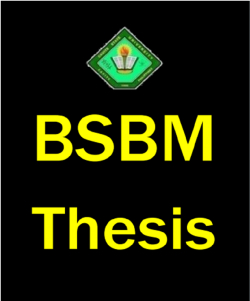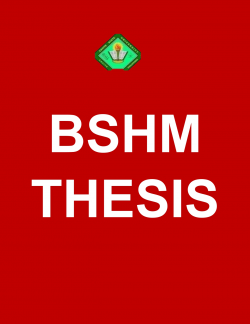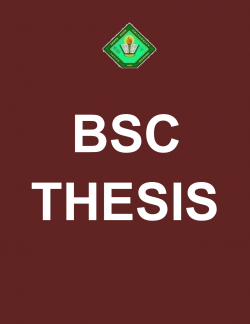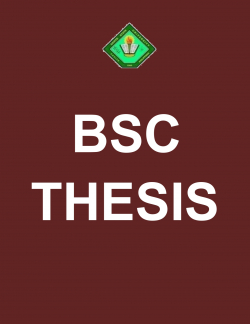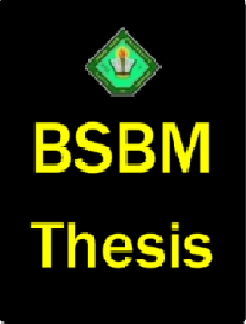Self-Service Kiosks: Level Of Adaptability of Chowking Establishments in Bacoor City, Cavite
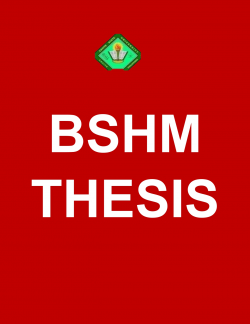
Type
Thesis
Authors
Category
Thesis-BSHM
[ Browse Items ]
Publication Year
2023
Subject
Self-service technologies—Philippines—Case studies. Technology acceptance model. Restaurants—Automation—Philippines. Fast food restaurants—Philippines—Management. Customer relations—Technological innovations—Philippines.
Abstract
This study aims to determine the level of adaptability of Chowking
establishments towards self-service kiosks (SSKs) along Bacoor City, Cavite. Self-
service technology has become increasingly popular in the food service industry,
offering convenience, efficiency, and a contactless alternative for customers. The
study adapts the Technology Acceptance Model (TAM) 2 as a theoretical framework
proposed by Davis and Venkatesh in 2000. It explores main factors such as perceived
usefulness, perceived ease of use, subjective norms, and cognitive instrumental
processes to understand the adaptability of Chowking establishments along Bacoor
City, Cavite towards SSKs.
A quantitative research design was utilized, and data was collected through
survey questionnaires administered to managerial personnel of Chowking
establishments along Bacoor City, Cavite. The questionnaire included the
demographic data of the respondents, such as their position in the establishment. It
also determined the level of adaptability using the main factors such as perceived
usefulness, perceived ease of use, social influence processes, and cognitive
instrumental processes. Additionally, it included several variables, namely subjective
norm, image, job relevance, output quality, and result demonstrability. The
questionnaire also sought to understand if there is a significant relationship between
the level of adaptability of Chowking establishments towards SSKs, perceived
usefulness, and perceived ease of use.
The findings indicate a high level of adaptability among Chowking
establishments towards SSKs. They also state that there is a positive and significant
relationship between the level of adaptability of Chowking establishments towards
SSKs, perceived usefulness, and perceived ease of use. The study provides valuable
insights for managerial personnel, restaurant owners, hospitality management
students, IT professionals, and future researchers interested in the adaptability of food
establishments toward self-service technology.
The results and interpretation of the data highlight the importance for fast food
establishments to adopt a self-service kiosk. This is because it will be useful in
improving the quality of innovations, improving work productivity, listing the menu and
prices, providing precise and clear instructions, lessening the queueing time, adding
prestige to the establishment, and making the technology easy to understand and use.
establishments towards self-service kiosks (SSKs) along Bacoor City, Cavite. Self-
service technology has become increasingly popular in the food service industry,
offering convenience, efficiency, and a contactless alternative for customers. The
study adapts the Technology Acceptance Model (TAM) 2 as a theoretical framework
proposed by Davis and Venkatesh in 2000. It explores main factors such as perceived
usefulness, perceived ease of use, subjective norms, and cognitive instrumental
processes to understand the adaptability of Chowking establishments along Bacoor
City, Cavite towards SSKs.
A quantitative research design was utilized, and data was collected through
survey questionnaires administered to managerial personnel of Chowking
establishments along Bacoor City, Cavite. The questionnaire included the
demographic data of the respondents, such as their position in the establishment. It
also determined the level of adaptability using the main factors such as perceived
usefulness, perceived ease of use, social influence processes, and cognitive
instrumental processes. Additionally, it included several variables, namely subjective
norm, image, job relevance, output quality, and result demonstrability. The
questionnaire also sought to understand if there is a significant relationship between
the level of adaptability of Chowking establishments towards SSKs, perceived
usefulness, and perceived ease of use.
The findings indicate a high level of adaptability among Chowking
establishments towards SSKs. They also state that there is a positive and significant
relationship between the level of adaptability of Chowking establishments towards
SSKs, perceived usefulness, and perceived ease of use. The study provides valuable
insights for managerial personnel, restaurant owners, hospitality management
students, IT professionals, and future researchers interested in the adaptability of food
establishments toward self-service technology.
The results and interpretation of the data highlight the importance for fast food
establishments to adopt a self-service kiosk. This is because it will be useful in
improving the quality of innovations, improving work productivity, listing the menu and
prices, providing precise and clear instructions, lessening the queueing time, adding
prestige to the establishment, and making the technology easy to understand and use.
Description
This undergraduate thesis investigates the adaptability of Chowking establishments in Bacoor City, Cavite toward the implementation of self-service kiosks (SSKs), using the extended Technology Acceptance Model (TAM 2) as a theoretical framework. The study applies a quantitative approach through surveys distributed to managerial personnel. It evaluates constructs such as perceived usefulness, perceived ease of use, subjective norms, image, job relevance, output quality, and result demonstrability. Findings indicate a high level of adaptability and a significant relationship between perceived usefulness and ease of use with the establishments' willingness to adopt SSKs. The study offers relevant insights for food service managers, IT professionals, and future researchers on the integration of self-service technologies in fast-food operations.
Biblio Notes
Calaor, G. B. (2023). Adaptability of Chowking establishments toward self-service kiosks (SSKs) along Bacoor City, Cavite (Undergraduate thesis). Cavite State University – Bacoor City Campus.
Number of Copies
1
| Library | Accession No | Call No | Copy No | Edition | Location | Availability |
|---|---|---|---|---|---|---|
| CvSU Bacoor City Campus | 6000157 | 1 | Yes |
